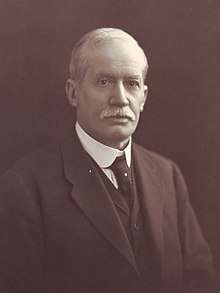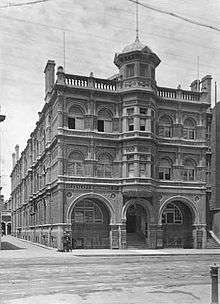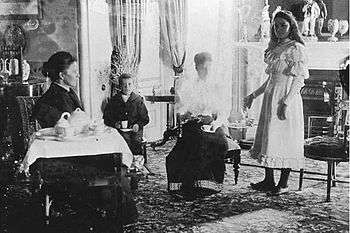George Brookman
Sir George Brookman KBE (15 April 1850 – 20 June 1927) was a South Australian businessman who made a fortune from a gold discovery in Western Australia, and is remembered as a generous benefactor of the South Australian School of Mines and Industries and the University of Adelaide.

History
Brookman was born 15 April 1850 in Glasgow, Scotland, the eldest son of typesetter Benjamin Brookman (16 September 1826 – 11 June 1917) and his wife Jane née Wilson (d. 1 March 1881).[1][2][3] The family emigrated to South Australia in 1852 on the Water Lily, arriving at Port Adelaide on 5 May and settled in Prospect. After completing his education at the schools of James Bath and E. C. Mitton,[2] he found employment with grocery firm D & J Fowler. Then, with fellow-employee William Finlayson jun., he took over Fowler's retail arm in King William Street.[2] He set himself up as a stock and share broker and earned a position in the Adelaide Stock Exchange in 1890.[4]
In 1893 he founded, with brother William Brookman and Sam Pearce, the Coolgardie Gold Mining and Prospecting Co. Ltd. syndicate which financed the exploration and proving of a mining lease "Ivanhoe" in Kalgoorlie, Western Australia, in what was later dubbed the "Golden Mile" and made its backers incredibly wealthy. The syndicate owed its success to dogged determination in the face of criticism from experts, as the mineral was in a form that had not been encountered before[4] and through "Brookman's extraordinarily skilful financial transactions and able administration".[2]
He stood successfully for the Central District vacancy in South Australia's Legislative Council in 1901[5] caused by the resignation of Charles Kingston, who took up a seat in the new Federal Parliament. He was re-elected, but did not stand for the elections of 1910.[6]
Business Activities

- In 1896 he commissioned a four-storey block of offices "Brookman Building" at 35 Grenfell Street, Adelaide,[7] previously the site of the Commercial Hotel.[8] The architect was Alfred Wells.[9]
- He was chairman from 1898 to 1922 of the South Australian Electric Light and Motive Power Company and its successor, the Adelaide Electric Supply Company.
- He was a director of the Bank of Adelaide.[10]
- He was a director of the Mintaro Slate Company.[7]
Public works
- He was a member of the North Adelaide Congregational Church, and for many years Finance Secretary of the Congregational Union.
- He gave £15,000 towards the eventual £50,000 cost of the School of Mines and Industries building on the Frome Road corner of North Terrace. The School had been housed in the Jubilee Exhibition Building (which was adjacent on the west side, and is now the site of the Ligertwood and Napier buildings), but had long since outgrown the space available to it.[11]
- A feature of the building is the great stained-glass windows in Brookman Hall, locally produced by E. F. Troy, celebrating the British Empire, and those to the south of the building, adjacent the stairway, made by the firm of H. L. Vosz, depicting British scientists and technologists Watt, Newton, Stephenson, Bessemer, Kelvin, Faraday, Wren and Dalton.[12]
- He gave practical support to the University of Adelaide and was for many years a member of its council.
- He was also strongly associated with the Adelaide Children's Hospital.
- He was involved with various patriotic movements, especially during the Great War: the State Repatriation Board, the Red Cross Society, the Anzac Hospitality Committee,[13] and other organisations with similar aims.
Recognition
- The large assembly hall of the School of Mines building, for which he contributed so generously, was named for him, as colloquially has the building itself.
- He was knighted (KBE) on 19 October 1920 for his "Services during the War" to the State, the Commonwealth, and the Empire.[7][14]
Family
Parents
George's mother Jane died on 1 March 1881.
His father, Benjamin (ca.1827 – 11 June 1917), then married Charlotte Elizabeth Ragless (ca.1847 – 1945) on 27 September 1883. Charlotte Elizabeth was the eldest daughter of John Ragless (ca.1815 – 27 May 1899)[15]
Their home was "Kelvin Lodge", (perhaps 3 Daphne St.) Prospect. After the death of her husband, Charlotte Elizabeth lived with her daughter Charlotte Evelyn "Lottie" Botten.[15]
Siblings
- Children of Benjamin and Jane included
- George Brookman (15 April 1850 – 20 June 1927), the subject of this article
- Benjamin (Joseph) (ca.1855 – 22 May 1932) married Lillian Alice Augusta (August?) Hassall ( – 13 May 1930) on 29 January 1878.
- William Gordon (ca.1860 – 5 January 1910)
- James ( – ) moved to California
- Lillian ( – ) married Benjamin Edward Ragless (3rd son of John Ragless, born ca.1851) on 12 December 1878
- Katherine Isabella "Kate" Brookman ( – 2 November 1893) married John White of Kent Town on 24 August 1882 (son Howard Gordon White born 24 October 1893).
- Children of Benjamin and Charlotte Elizabeth included
- John Ragless Brookman (5 June 1885 – 1971) married Elsie Elizabeth Parker (ca.1885 – 10 June 1919) on 22 March 1910[16]
- Charlotte Evelyn "Lottie" ( – 13 June 1945) married Norman Leonard Botten ( – ) on 26 December 1914
Family of George Brookman

L-to-R: Mrs. Brookman, Norman, Miss Ada Crossley and May
He married Eliza Martha Marshall (10 February 1859 – 26 January 1931) at St Kilda, Victoria on 13 February 1878.
Their children included:
- Alice May Brookman (18 May 1879 – ) married (Sir) Thomas George Wilson M.B.[17] on 4 June 1902. They divorced in 1920.[18]
- George Wilson Brookman (11 August 1881 – ) married Mary "Polly" Shiels on 23 August 1915
- (Harry) Norman Brookman (22 January 1884 – 26 April 1949) married Ada Mary Dorothy "Nan" Burden (24 April 1889 – 1975) on 6 March 1912.[19] Nan was the elder daughter of Fred Burden.
- Their son, David Norman Brookman (24 March 1917 – 22 May 2000) was elected to the House of Assembly seat of Alexandra in 1948 for the LCL and held it until 1973.
- Howard Brookman (6 June 1886 – )
Their home was either "Craigmellon" at 3 Edwin Terrace, Gilberton, or "Ivanhoe" at 9 Edwin Terrace.[20][21] He died on 27 June 1927 at "Blair Athol", Avenel Gardens, Medindie.[22] He was survived by his wife, his daughter, and two of his sons.[2]
References
- "Death of Sir George Brookman". South Australian Register. Adelaide: National Library of Australia. 21 June 1927. p. 9. Retrieved 18 February 2016.
- R. M. Gibbs, 'Brookman, Sir George (1850–1927)', Australian Dictionary of Biography, National Centre of Biography, Australian National University, accessed 2 December 2012.
- "Mr. Benjamin Brookman". South Australian Register. Adelaide: National Library of Australia. 1 November 1915. p. 9. Retrieved 4 December 2012.
- "A Public-Spirited Citizen". The Advertiser. Adelaide: National Library of Australia. 21 June 1927. p. 13. Retrieved 1 December 2012.
- "The State Elections". The Advertiser. Adelaide: National Library of Australia. 3 June 1901. p. 9. Retrieved 1 December 2012.
- "The State Elections". South Australian Register. Adelaide: National Library of Australia. 11 March 1910. p. 8. Retrieved 4 December 2012.
- "Biographical". The Chronicle. Adelaide: National Library of Australia. 23 October 1920. p. 38. Retrieved 4 December 2012.
- "Building Improvements in the City". The Adelaide Observer. South Australia. 18 July 1896. p. 15. Retrieved 1 January 2020 – via Trove.
- "Brookman's Buildings". South Australian Register. South Australia. 3 November 1896. p. 7. Retrieved 1 January 2020 – via Trove.
- "Sir George Brookman". The Advertiser. Adelaide: National Library of Australia. 11 June 1927. p. 13. Retrieved 1 December 2012.
- "The Late Sir George Brookman". The Advertiser. Adelaide: National Library of Australia. 21 June 1927. p. 12. Retrieved 1 December 2012.
- Natalie Carfora. "The School of Mines and Industry: Stained glass windows". Adelaide City Explorer. Retrieved 1 January 2020.
- "Welcome to Anzacs". The Advertiser. Adelaide: National Library of Australia. 5 December 1918. p. 5. Retrieved 8 December 2012.
- Knight Commander of the Order of the British Empire (KBE), 19 October 1920, It's an Honour
- "Obituary – Charlotte E Brookman". The Advertiser. Adelaide: National Library of Australia. 14 July 1945. p. 3. Retrieved 3 December 2012.
- John Ragless Brookman was educated at Whinham College, the University of Adelaide and the SA School of Mines and Industries. He joined the Adelaide Electric Supply Company as a draughtsman in 1909 and was promoted to Engineer in 1913. He was awarded Master of Engineering in 1925 for his thesis on relay protection for electrical circuits. In 1947 he was appointed Deputy Manager and Engineer in charge of distribution and supply. He was a foundation member of the SA Institute of Engineers and in 1927 was Chairman of the SA division of the Institution of Engineers. He was a vice-president of the School of Mines and Industries. – Cumming, D. A. and Moxham, G. They Built South Australia published by the authors 1986 ISBN 0 9589111 0 X
- J. H. Love, 'Wilson, Sir Thomas George (1876–1958)', Australian Dictionary of Biography, National Centre of Biography, Australian National University, accessed 10 December 2012.
- "In Divorce". The Sydney Morning Herald. National Library of Australia. 2 September 1920. p. 4. Retrieved 10 December 2012.
- (Harry) Norman Brookman lived at "Burbrook", a farm near Meadows, South Australia and was member of the South Australian Legislative Council from 1941 to 1949, when he was killed in a car crash near Noarlunga. "Killed in Car Smash". The Chronicle. Adelaide: National Library of Australia. 28 April 1949. p. 3. Retrieved 4 December 2012.
- Historic Landmark Property, 3 Edwin Terrace, Gilberton, priceypads.com
- Heritage Plan Amendment Reports, Walkerville News, April–June 2007, The Corporation of the Town of Walkerville, pg.3
- "Family Notices". The Advertiser. Adelaide: National Library of Australia. 21 June 1927. p. 12. Retrieved 2 December 2012. – Death notice of George Brookman.
External links
- "Mr. G. Brookman". The Advertiser. Adelaide, SA: National Library of Australia. 27 February 1901. p. 8. Retrieved 1 December 2012.
- "The State Parliament". The Advertiser. Adelaide, SA: National Library of Australia. 24 May 1901. p. 6. Retrieved 1 December 2012.